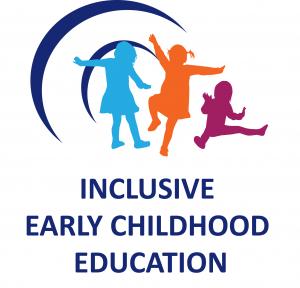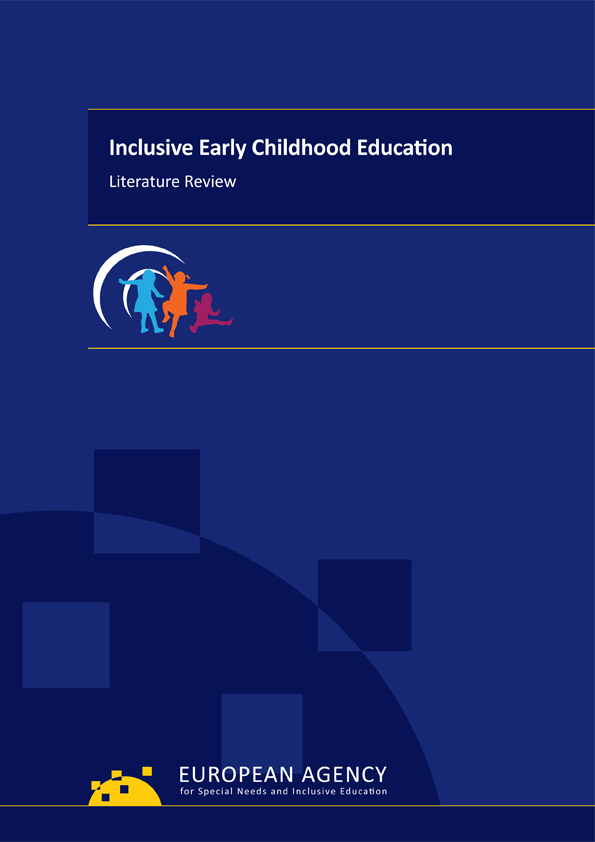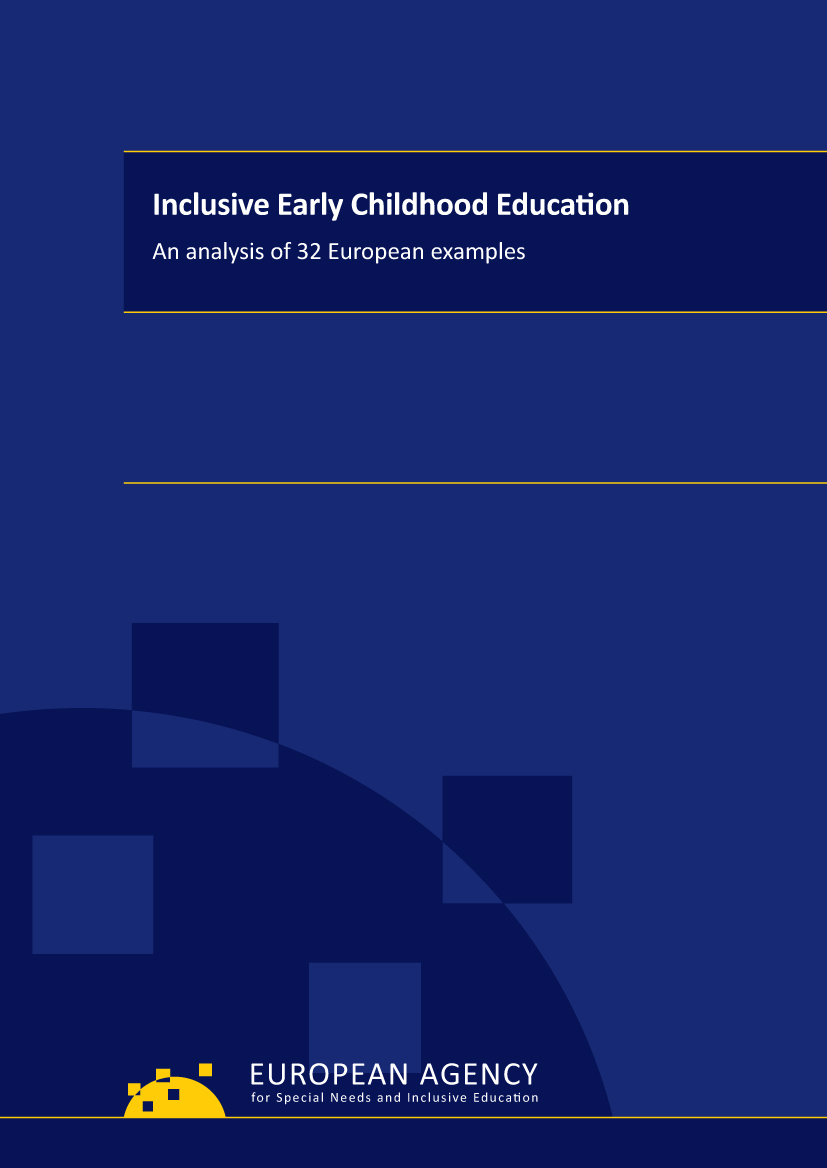This three-year thematic project (2015–2017) built upon the main outcomes of the Agency’s previous Early Childhood Intervention projects (2004, 2010). The Inclusive Early Childhood Education (IECE) project aimed to identify, analyse and subsequently promote the main characteristics of quality IECE for all children.
It focused on the structures and processes that can ensure a systemic approach to providing high-quality IECE. High-quality IECE effectively meets the academic and social learning needs of all children from the school’s local community (from 3 years old to the start of primary education – 5–7 years old).
Project framework
The IECE project aligned with the Proposal for key principles of a Quality Framework for Early Childhood Education and Care (ECEC) (2014). This was produced by the European Commission Thematic Working Group on ECEC to support Member States to develop quality ECEC systems as part of the education system.
The IECE project focused on five thematic areas, from the perspective of quality inclusive provisions:
- Access to quality early childhood education (ECE) for all children. From the project’s perspective, this refers to facilitating access for all children in the community. It particularly concerns the most vulnerable children. This includes those with disabilities and special educational needs, immigrants, newcomers and other at-risk children and families.
- Workforce quality. This principle calls for appropriately trained staff with access to continuous training and adequate working conditions. It also calls for appropriate leadership and support staff inside and outside the school. Adequate resources, positive parent collaboration and inter-disciplinary and inter-agency collaboration are also necessary.
- Quality curriculum/content. This principle underlines the need for holistic and flexible curricula and pedagogy that promote child well-being. These promote learning in all aspects of development – cognitive, social, language, emotional and physical – and enable children to be meaningfully and actively engaged in a safe but open and stimulating environment.
- Evaluation and monitoring. This not only refers to how children’s development and learning is monitored, but also to the ECE provision’s effectiveness in meeting established quality standards. Such standards ensure a quality learning environment for all children.
- Governance and funding. This principle considers the accountable use of public funding and leadership models to ensure that a quality ECE service is available to all children and is managed with a constant focus on enabling each child’s holistic growth and learning.
The project paid attention to three fundamental transversal issues in quality ECE, namely:
- The need for a holistic child-centred approach based on an appreciation of each child as a unique, capable and active co-creator of learning
- The need for close partnership with families
- The need to ensure quality structures and processes.
The project made three main new contributions to inclusive early childhood education:
- First of all, the project found that the high-quality IECE services that benefited all children were guided by an inclusive vision and worked towards inclusive goals. Their primary outcome was to ensure each child’s belongingness, engagement and learning.
- The IECE project’s second contribution was a Self-Reflection Tool. It enables practitioners to review their service’s quality in terms of the inclusiveness of the physical, social and other learning environments it offers to children and families.
- The project’s third contribution was a new Ecosystem Model of Inclusive Early Childhood Education. This is grounded in the project data. Three major frameworks for quality IECE inspired it. These are the structure-process-outcome framework, the ecological systems framework and the inclusive education perspective. It can support policy-makers and practitioners to collaborate in planning, reviewing and improving quality IECE services.
Participants and target group
The IECE project involved the following Agency member countries: Austria, Belgium (French speaking community), Croatia, Cyprus, Czech Republic, Denmark, Estonia, Finland, France, Germany, Greece, Hungary, Iceland, Ireland, Italy, Latvia, Lithuania, Luxembourg, Malta, Netherlands, Norway, Poland, Portugal, Slovakia, Slovenia, Spain, Sweden, Switzerland and the United Kingdom (England, Northern Ireland, Scotland and Wales). Two experts per country were involved in the project activities.
The project outputs mainly targeted policy- and decision-makers at national and local levels. It is anticipated that the project outcomes will also be of interest to researchers and practitioners in the area of inclusive early childhood education.
Aims
The project’s overall goal was to identify and analyse the factors (facilitators and challenges/barriers) that enable quality and effective IECE programmes for all learners in inclusive settings.
It aimed to collect information about all children – focusing on the most vulnerable ones – in inclusive ECE settings in Europe. The project also explored the resources allocated to meet their needs and described the main characteristics of the educational contexts where these learners are included.
The project’s key question was:
- What are the main characteristics of quality inclusive early childhood education for all children?
Project activities and outputs
The project activities and outputs consisted of:
- A literature and policy review, providing the project conceptual framework and including a review of post-2000 international and European research literature and policy papers on the project themes.
- Country questionnaires for collecting information about national policy and practice in relation to IECE.
- Examples of inclusive practice in ECE: Agency member countries were asked to identify and describe innovative examples of inclusive practice in ECE. The project team received 32 examples.
- Qualitative analysis of examples: The project team conducted a qualitative analysis of the 32 examples of how IECE providers perceive inclusion and try to provide it. It provides interesting practice evidence about several main issues that are important in inclusive ECE settings.
- Case study visits: Eight of the proposed IECE examples were selected, on the basis of some quality criteria, for more in-depth investigation. Detailed reports on the eight selected case study sites, including analysis of the key project themes investigated, were drafted.
- A self-reflection tool for the IECE environment was developed for practitioners to use. It consists of sets of questions about the inclusiveness of the ECE environment. These focus on an overall welcoming environment, an inclusive social environment, a child-friendly physical environment, materials for all children, opportunities for communication, a child-centred learning environment, an inclusive teaching environment and a family-friendly environment. These sets of questions served as an observation tool during the case study visits. They were developed into a self-reflection tool, which has been translated into all Agency languages.
- Synthesis report: All the information collected over the project’s lifetime was combined into a synthesis report. This will support policy-makers and practitioners at local, national and European levels in promoting IECE provisions that ensure the necessary strong start for all children. The project will particularly highlight how ECE settings can be truly inclusive by building their capacity to educate all the children in the community with the backing of national policy and investment in this highly influential area of education.
- Final Summary Report: This report is a summary of the synthesis report that brings together the main findings of the IECE project. The summary report focuses on the project’s three new contributions to policy-making, research and practice in IECE. The report concludes with a set of recommendations mainly directed at policy-makers.


